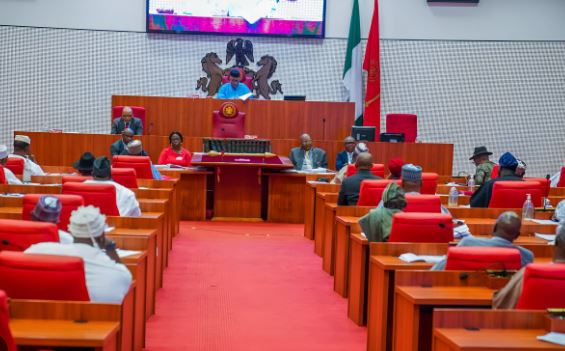Senate to debate motion on justice for victims of violence

By John Alechenu
Barring any last-minute change, the Senate will on Tuesday debate a motion seeking justice and accountability for victims of violent crimes irrespective of religious beliefs.
The motion titled: “Urgent need to correct misconceptions regarding the purported Christian Genocide Narrative In Nigeria and International Communities,” is being sponsored by Senators: Ali Ndume (APC, Borno), Sani Musa (APC, Niger), Magatakarda Wamako (APC, Sokoto) and Ibrahim Bomai (APC, Yobe).
Those familiar with the issue informed Vanguard that the motion was likely in response to an American Political Commentator and Television Host, Bill Maher, who had, in a widely publicized speech, alleged that terror gangs were carrying out a genocidal war against Nigerian Christians.
Sponsors of the motion are asking the Senate to,
among other things: “Urge the Federal Government to ensure justice and accountability for all victims of violent attacks—whether Christian, Muslim, or otherwise—to address impunity and rebuild public confidence in state institutions.”
A draft of the motion, which was sighted in Abuja on Monday, indicated that its sponsors are seeking to correct what they described as misinformation about the true nature of the conflict in Nigeria.
According to the four Senators, while they acknowledge the tragic and unacceptable attacks suffered by Christian communities in parts of the country, they affirm that violence has affected Nigerians of all faiths.
They, however, argued that looking at the crisis purely as a religious one risks inflaming sectarian divisions, misguiding international policy, and undermining national unity.
The motion reads in part: “The Senate: Aware that Nigeria is a multi-ethnic, multi-religious nation whose unity and stability depend on mutual understanding, responsible communication, and accurate representation of facts;
“Concerned about the increasing circulation of narratives—both within and outside Nigeria—alleging an ongoing “Christian genocide” in the country, which have been amplified by certain foreign media outlets, advocacy groups, and religious networks.
“Further Concerned that these narratives, though emotive, often fail to reflect the complex realities of Nigeria’s security challenges and may fuel sectarian mistrust, distort international perceptions, and undermine national cohesion and Nigeria’s diplomatic relations;
“Notes that Nigeria has in recent years faced serious security challenges, including terrorism, insurgency, banditry, communal conflicts, and targeted attacks, which have affected citizens across various religious, ethnic, and regional backgrounds, resulting in loss of lives and property among both Christian and Muslim communities;
“Notes that the 1999 Constitution of the Federal Republic of Nigeria (as amended) guarantees freedom of religion, equal protection of the law, and obliges the government to secure the lives and property of all citizens, irrespective of faith or ethnicity;
“Recognises the critical role of accurate information and responsible leadership in preventing sectarian division and countering extremist narratives;
“Worried about the recent events in the US Senate and Congress where they have taken initiatives to designate Nigeria as a “Country of Particular Concern,” which is a foreign policy tool to target human rights or religious freedom violations.”
Prayers
The sponsors are praying that the Senate resolve to:
“Reject the blanket characterisation of Nigeria’s security crises as a “Christian genocide,” and affirm that the ongoing conflicts are rooted in complex socio-economic, ethnic, criminal, and terrorist dynamics which cut across religious lines.
“Urge the Federal Government, through the Ministry of Foreign Affairs, Security agencies, and relevant stakeholders, to intensify data-driven public communication by providing accurate casualty figures, context, and investigative outcomes to counter misinformation.
“Call on Religious leaders, Civil society organisations, and the Nigerian media to exercise restraint and responsibility in their public statements and reporting, avoiding language that could inflame sectarian tensions or misrepresent the national situation.
“Encourage diplomatic missions, especially the US Embassy, International organisations, and foreign media to rely on verified, balanced, and credible sources—including Security agencies, local communities, and independent observers—when reporting on religiously sensitive issues in Nigeria.
“Mandate the Senate Committees on Foreign Affairs, Information, National Security and Intelligence; and any relevant committee as may be deemed appropriate) to:
“Work with the Executive to develop a coordinated national communications strategy to clarify misinformation on religious violence;
“Engage the US Senate and Congress; International partners and Diaspora networks through official briefings and fact-based publications to correct misconceptions.
“Support interfaith peace building programmes that emphasise shared victimhood and national unity.”
The post Senate to debate motion on justice for victims of violence appeared first on Vanguard News.







